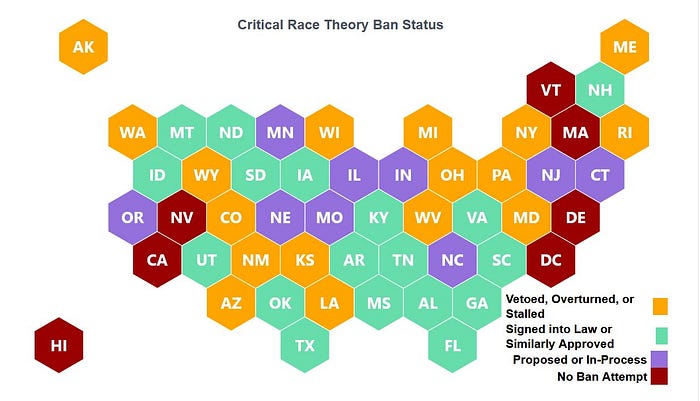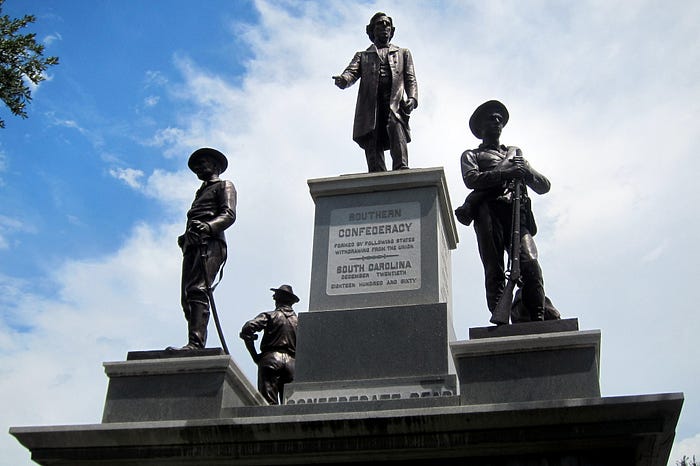Racism & White Supremacy
Purpose of the Story
In a previous article, I compared recent attempts by conservative legislatures to pass laws prohibiting the teaching of American history that emphasizes the systemic oppression of Black people by white people to attempts by American anti-abolitionists to limit the dissemination of abolitionist teachings that emphasized and rejected the systemic oppression of enslaved Black people by white America.
A respondent, Blanc2, replied by writing, "I find so much irony in the fact that some of the most outspoken critics of falsely labeled "CRT" are the same people who oppose the removal of Confederate monuments from public places."
As an African-American university professor, I found the response intriguing. I decided, therefore, to investigate to see if states banning so-called "CRT" (Critical Race Theory) also protect Confederate monuments. My findings are quite revealing.
CRT bans and defense of Confederate monuments
As demonstrated in my earlier article, CRT is an academic and legal framework developed 40 years ago to examine and analyze how racism is embedded in America's laws and institutions. CRT requires "critical" analysis that goes far beyond what is taught in k-12 public schools. In other words, CRT is not currently being taught in public schools in America.
So-called "CRT bans" being passed by conservative state legislatures are not about banning CRT. Instead, they are intended to prohibit teachings that highlight the racist history of America or that suggest that racism is (or ever has been) a systemic problem in the U.S.A.
Many of the so-called "CRT bans" use language prohibiting the teaching of "divisive" concepts, especially concepts that might make "an individual feel discomfort, guilt, anguish, or any other form of psychological distress on account of their race or sex."
As of the writing of this article, 43 states in the U.S.A. have passed, are in the process of passing, or have attempted to pass anti-CRT legislation.

While 43 states have attempted to pass laws banning the teaching of so-called "divisive" concepts, 21 states have introduced bills protecting divisive Confederate monuments.

All 21 states have passed, are in the process of passing, or have attempted to pass so-called "anti-CRT" legislation. While lawmakers in these states claim to want to prevent students from feeling "discomfort, guilt, anguish, or any other form of psychological distress on account of their race," they do not care that Confederate monuments cause Black people living in their state to feel discomfort, guilt, anguish, [and] other form[s] of psychological distress on account of their race.
A USA TODAY review found that in the past decade, legislators in these states have proposed more than 100 bills that would limit changes to hundreds of Confederate monuments. Some of these "statue statutes" legislate harsh financial penalties or criminal charges against municipalities that remove monuments.
If these states ban divisive teachings because they want to alleviate feelings of "discomfort…anguish, and… psychological distress", why do they protect divisive Confederate monuments that contribute to discomfort, anguish, and psychological distress among Black people?
It's all about promoting white supremacy.
Public school curricula in America have always made Black people "feel discomfort, guilt, anguish, and various other forms of psychological distress on account of their race." Most white people have ignored this because public school curricula has historically made most white people feel comfortable and superior on account of their race.
Most of the so-called "anti-CRT" bills introduced by state legislatures have explicitly sought to ban the teaching of the 1619 Project. Nikole Hannah-Jones, a Pulitzer Prize–winning reporter covering racial injustice for The New York Times Magazine, created the landmark 1619 Project. The project represents a reframing of American history that places slavery and its continuing legacy at the center of America's national narrative.
I live in Iowa, one of several states that have passed a law banning the 1619 Project. Ironically, Nikole Hannah-Jones grew up and received her public school education in Iowa, where she says the inspiration for her work was born. According to Hannah-Jones, her Iowa public education did not resonate with her lived realities nor with the shared lived realities of her immediate and extended family.
The Iowa law banning the 1619 Project also forbids the teaching of 10 "specific defined concepts." The banned concepts include ideas such as the notion that Iowa or the U.S.A. are "fundamentally or systemically racist or sexist." The law also prohibits suggesting that someone of any race or sex "bears responsibility for actions committed in the past" by members of their race or sex.
Teaching an accurate history of slavery and systemic racism is not about suggesting anyone today "bears responsibility for the past." Instead, it's about acknowledging the past honestly and recognizing the harmful legacies resulting from that past.
The Iowa law includes the commonly used language banning the teaching of anything that might make "an individual feel discomfort, guilt, anguish, or any other form of psychological distress on account of their race or sex."
States and school boards have never cared that school curricula in America make Black people, women, or members of the LGBTQIA+ community feel discomfort, guilt, anguish, or any other form of psychological distress on account of their race, sex, or sexual orientation.
Black school children have consistently been taught that white people have accomplished every outstanding achievement in the world. Black children are taught that Black people have contributed virtually nothing to world civilization.
Public school curricula rarely teach anything about the accomplishments of Black people. I learned very little in my k-12 public education about the societal contributions of Black people. It was only as I made efforts to expand my reading to include materials not included in my public education that I began to realize that it wasn't that Black people hadn't made significant societal contributions. Instead, it was that my school teachers had chosen to exclude these histories and these stories.
How can Black students not feel discomfort, guilt, anguish, or other forms of psychological distress on account of their race when they and their white classmates are taught that Black people are inferior to white people?
American historian Carter G. Woodson argued in his classic seminal book, The Mis-education of the Negro, that the American education system was designed to promote Black inferiority in order to maintain white supremacy.
If you can control a man's thinking you do not have to worry about his action. When you determine what a man shall think you do not have to concern yourself about what he will do. If you make a man feel that he is inferior, you do not have to compel him to accept an inferior status, for he will seek it himself.
This systematic process of mis-education discourages many Black people from pursuing excellence. Black children rarely see themselves presented positively in public school curricula. They see themselves PRIMARILY presented as "slaves" or people needing the help of benevolent white patrons. School curricula rarely show Black people as active agents making significant societal contributions. Representation matters.
Governor Kim Reynolds' Republican colleague, former Iowa Senator Steve King, publicly declared during a Republican National Convention that white "Euro-American Christians" are the ONLY people who have made significant contributions to world civilization. Senator King's remarks are a reflection of how public education in America has consistently denigrated Black, Indigenous People of Color (BIPOC).
I once had a white 18-year-old college student come to my office after a lecture I had given and tell me that if Black people wanted to be "respected as a people," they needed to learn to do more than sing, dance, and play sports. I was the first Black "teacher" he had ever had, and his k-12 public education had never exposed him to the long history of black inventors, scientists, politicians, activists, thinkers, and intellectuals in America. By intentionally ignoring Black achievement, public school curricula consistently promote black inferiority and white superiority.
It is this promotion of white superiority that fuels most of the book bans in the U.S.A. According to the American Library Association, books most frequently targeted for banning have been by or about Black or LGBTQIA+ people. Books by Black authors, many of which promote Black achievement and resistance to white superiority, are disproportionately banned at alarming rates.
While advocates of book bans claim to be protecting children from "indoctrination," banning books primarily by or about Black and LGBTQIA+ people promotes indoctrination. Ibram X Kendi articulates it best:
It's so striking that when a book challenges notions of Black inferiority, it's considered indoctrination. But then, when a book says nothing about Black people or reinforces notions of Black inferiority, it's considered education.
Promoting Black inferiority has long been considered education, while challenging white superiority is often labeled "indoctrination." A training video designed to help Florida teachers identify books to ban reveals that book banning is about promoting white supremacy and defending white innocence.
Using the language found in many of the so-called "anti-CRT" bills, the training video instructs media specialists to ban all materials suggesting that people are inherently racist, sexist, or oppressive, that anyone bears responsibility for past actions of their race or sex, or that anyone should feel "discomfort, guilt, anguish, or other forms of psychological distress" related to race or gender.
It should be evident that book bans and curricula prohibitions are meant to protect cisgender hetero-normative white people from feelings of "discomfort, guilt, or other forms of psychological distress." Supporters of these bans and prohibitions argue that America has never been systemically racist. They assert that white America as a nation is "innocent" and that white success is primarily based on white superiority.
Similarly, supporters of Confederate monuments assert that the preservation of Confederate monuments should not promote guilt, anguish, or other forms of psychological distress among Black people because the monuments are about Southern pride and history, not about slavery and racism.
Conclusions
All of these laws prohibiting what can be taught about racism, banning what can be read in public schools and supplied in public libraries, and protecting Confederate monuments have one thing in common: they're all designed to promote myths of white innocence and white supremacy.
States genuinely concerned with eliminating divisive materials that make people feel "discomfort, guilt, anguish, or any other form of psychological distress on account of their race" need to remove divisive Confederate monuments from public spaces of honor.
They also need to stop banning books in public libraries and prohibiting the teaching of school curricula that challenge notions of white innocence, white supremacy, and Black inferiority.
Despite claims made by legislators banning the teaching of the 1619 Project and so-called "CRT," no one is suggesting that white people "bear responsibility for actions committed in the past" by members of their race.
While the phrases are often used interchangeably, "bearing responsibility" and "taking responsibility" differ. No white person alive today "bears responsibility" for the creation of racist ideology in America. White people, however, need to "take responsibility" for ending the ongoing perpetuation, legacy, and ramifications of racist ideology and white supremacy.
The reality of America's racist foundation is not something white people should feel "guilty" about. Instead, it's something white people should take responsibility for.
Guilt often carries "blame" and frequently results in feelings of powerlessness, whereas taking responsibility empowers. Taking responsibility implies a commitment or obligation to correct things. On the other hand, guilt often results in a paralyzing feeling of bearing responsibility for the way things are with no ability (or commitment) to change things.
White "guilt" does not benefit Black people. Guilt is about self, whereas taking responsibility is about others. If white people feel guilty or feel like others are trying to make them feel guilty, it's most likely because they're focusing more on themselves than on others.
Black people are not interested in white guilt. Black people do not think white people "bear responsibility" for the racism of their ancestors. Black people want white people to "take responsibility" for working to bring an end to racism and white supremacy.
While white people can take responsibility in many ways, here are two easy ways related to this story. The first is to advocate for the removal of divisive Confederate monuments from public places of honor.
The second is to oppose (and encourage others to oppose) all legislative bans prohibiting the teaching of American history that make explicit America's systemic racist past.
The only way to move forward from a racist past to an anti-racist future is to acknowledge the reality of that racist past — not bearing responsibility for it but taking responsibility for it.
Thanks for reading. If you'd like to get my articles emailed to you directly, you can subscribe here. Learn more about Guy Nave here. See ALL of my Medium articles here. Follow me on Twitter: @guynave2.


